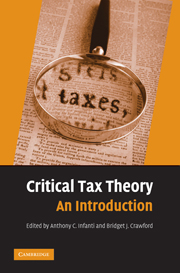Book contents
- Frontmatter
- Contents
- List of Illustrations
- List of Tables
- List of Contributors
- List of Common Abbreviations
- Introduction
- CHAPTER 1 FOUNDATIONS OF CRITICAL TAX THEORY
- CHAPTER 2 HISTORICAL PERSPECTIVES ON TAXATION
- CHAPTER 3 THE GOALS OF TAX POLICY
- CHAPTER 4 CRITICAL TAX THEORY MEETS PRACTICE
- CHAPTER 5 RACE AND TAXATION
- CHAPTER 6 GENDER AND TAXATION
- CHAPTER 7 SEXUAL ORIENTATION AND TAXATION
- Same-Sex Couples and the Federal Tax Laws
- The Internal Revenue Code as Sodomy Statute
- Heteronormativity and Federal Tax Policy
- Death Taxes: A Critique from the Margin
- Homo Sacer, Homosexual: Some Thoughts on Waging Tax Guerrilla Warfare
- CHAPTER 8 THE FAMILY AND TAXATION
- CHAPTER 9 CLASS AND TAXATION
- CHAPTER 10 DISABILITY AND TAXATION
- CHAPTER 11 GLOBAL CRITICAL PERSPECTIVES ON TAXATION
- CHAPTER 12 CRITICAL PERSPECTIVES ON CRITICAL TAX THEORY
- Index
The Internal Revenue Code as Sodomy Statute
Published online by Cambridge University Press: 04 August 2010
- Frontmatter
- Contents
- List of Illustrations
- List of Tables
- List of Contributors
- List of Common Abbreviations
- Introduction
- CHAPTER 1 FOUNDATIONS OF CRITICAL TAX THEORY
- CHAPTER 2 HISTORICAL PERSPECTIVES ON TAXATION
- CHAPTER 3 THE GOALS OF TAX POLICY
- CHAPTER 4 CRITICAL TAX THEORY MEETS PRACTICE
- CHAPTER 5 RACE AND TAXATION
- CHAPTER 6 GENDER AND TAXATION
- CHAPTER 7 SEXUAL ORIENTATION AND TAXATION
- Same-Sex Couples and the Federal Tax Laws
- The Internal Revenue Code as Sodomy Statute
- Heteronormativity and Federal Tax Policy
- Death Taxes: A Critique from the Margin
- Homo Sacer, Homosexual: Some Thoughts on Waging Tax Guerrilla Warfare
- CHAPTER 8 THE FAMILY AND TAXATION
- CHAPTER 9 CLASS AND TAXATION
- CHAPTER 10 DISABILITY AND TAXATION
- CHAPTER 11 GLOBAL CRITICAL PERSPECTIVES ON TAXATION
- CHAPTER 12 CRITICAL PERSPECTIVES ON CRITICAL TAX THEORY
- Index
Summary
I recently had occasion to read an issue of the North Carolina Law Review containing a symposium on critical tax theory. Most of the contributors focused their attention on issues relating to race and gender. Nevertheless, one of the contributors, Steve Johnson, did focus significant attention on issues relating to sexual orientation. Johnson concluded: “I believe that scholars and advocates have not yet convincingly demonstrated that, on net, the failure to recognize same-sex couples as married hurts them by imposing substantially higher federal income tax liabilities on them.”
My immediate reaction to Johnson's article can be summarized in one word: astonishment. As a gay man, I was puzzled at how equal treatment could be boiled down to a simple cost-benefit analysis. How could Johnson have ignored the ways in which the Code stigmatizes gays and lesbians and attempts to force them into the closet? Can any net tax benefit really make up for the patently unequal and discriminatory treatment visited by the federal government upon gays and lesbians through the medium of the Code?
THE NARRATIVE
Not many people at [my college] were out of the closet, and the environment wasn't particularly welcoming for the few who were open about their sexual orientation. I learned this for myself within a week of arriving at school. I had been assigned to an all-male dormitory that year. The testosterone level in the dorm ran high, and the antigay remarks and fag jokes were more pervasive and biting than I had ever experienced before. During that first week, when everyone feels vulnerable, nervous, and anxious about being away from home, I had a rather negative encounter with two upper-class students.
- Type
- Chapter
- Information
- Critical Tax TheoryAn Introduction, pp. 192 - 199Publisher: Cambridge University PressPrint publication year: 2009



